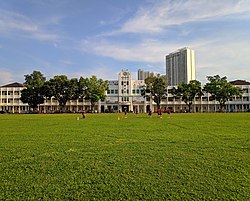You are about to read an unnecessary piece of self-indulged quippering.

| This user is a participant in WikiProject Malaysia. |
| 這個用戶是華人。 这个用户是华人。 This user is of Chinese ethnicity. | 華夏兒女 |
| en-5 | This user can contribute with a professional level of English. |
| ms-4 | Pengguna ini boleh menyumbang dengan taraf semacam bahasa ibunda dalam Bahasa Melayu. |
Good day. My name is Tan C.W.; or C.W. Tan (b. 2004), based on Western naming conventions. I'm a third-generation Chinese–Malaysian college student, semi-professional sketchist, a terrible poet and amateur writer. I've been a rather active Wikipedian in recent years, covering topics mostly related to Malaysia–my bittersweet nationality; the Chinese world–my cultural homeland, and anything English–my linguistic refuge.
Very often I call myself Gavreauri. Gavreauri was a randomly-generated name I received from the first account I created on EVE Online. It's been over two years since I last played the "spreadsheet-wondergame". It's fun, though. Brings you more perspectives on society online more than anything else. I also used to use the name PenangLion, from my days of adolescence. Penang represented my state of origin, and lion being derived from Lion's Club, a society my father used to involve himself in. I have long-ditched the latter name, although names on Wikipedia are arbitrary, it doesn't matter much.
Since my birth, I've been residing in the city of George Town, on the touristy side of the state of Penang. I studied in Union Primary School as a child, then the fabled Chung Ling High School during my high school years, and now as an undergraduate student in the Han Chiang University College of Communication. Being able to be an alumnus of Chung Ling really made me, and my parents, especially my father (another fellow alumnus from the 1970s), very proud. It is a prestigious and historical institution after all, and certainly one that's never less-tainted ever with the colours of modern school politics. Ironically, despite being part of a school that's historically focused on science and mathematics, I am now pursuing everything related to humanities.
I'm Buddhist. It may sound like a mild-surprise to some on Wikipedia where they could not really grasp and fathom the justification of believing in religions, but I do believe in one. Of course, I am not a fanatic. Strictly speaking, religion should be treated as a set of values, not a way of life and death. Everyone has the liberty to believe in religion, as long as you don't harm anyone. At least they have a set of values I could adopt and help myself and everyone for the communal well-being. Every religion does. However, filtering the ones that could not be applicable to modern society, is a massive challenge many have failed. I hope I won't.
You might wonder at this point, how would a Chinese person be residing in an Islamic country like Malaysia? Well, because I'm not, I was born in it. My grandfather, the relative whom I respected the most, was a native of Canton born during the tumultuous periods of the May Fourth Movement. He, along with millions of Chinese people, immigrated to the Straits Settlements in the 1930s, becoming a Straits Chinese for the first-half of his life. There he survived the hardships of war, escaped death, and eventually became a prolific merchant in the now mostly derelict town of Nibong Tebal. He even became a war profiteer during the Korean War, though I will probably never know the extent of his involvements. Today, the riches he earned are no more. Our family, the Tans, have returned to normalcy, a reality check for most of our relatives, who had lived under the guise of wealth for almost half-a-century.

Many foreigners, from China, Korea, Western Europe, or the Americas alike, would picture the stereotype that we are living in a country of religious fanatics and a love for basic suppression of human rights. But while the statements might be somewhat legitimate to some extent (i.e. the radicalist Malaysian Islamic Party with their awful and ostracised state-administrations of Terengganu and Kelantan), Malaysians are not that kind of people. Muslims, Buddhists, Christians, Hindus, Catholics, Taoists, Dayaks, Ibans, Kadazans, and the many, many other natives alike, we are all there with the hope of harmony and peace with each other. Although, admittedly, politics is a dividing issue in Malaysia, but culture is not. We embrace and cherish, tolerate and accept, for the sake of everyone's survival.
Well, shall I end the quippering and get straight to point?
I specialise in Malaysian Wikipedia topics. It's very fragile, and very hard to maintain. Sourcing is horrendous, still it is not an impossibility to properly cover each subject given the adequate patience and effort. However, I also provide translation services to Chinese Wikipedia articles. A bridge between my mother-tongue, and my language of writing. I have not done a lot in Wikipedia. I initially maintained several skyscraper articles for WikiProject Skyscrapers, but I surfaced more and I started involving myself in more general topics. I focused quite a lot during the early days of the 2022 Russian invasion of Ukraine (when the original article was still referred to as the "Russo–Ukrainian crisis"). Today, I have unfinished business with Reformasi, and every single Malaysian politics-related article. I hope the business will be finished. If you actually finished reading, then I assure you will have a lovely day. Au revoir!
Cheers, gavre (al. PenangLion) (talk) 16:40, 17 December 2022 (UTC)

